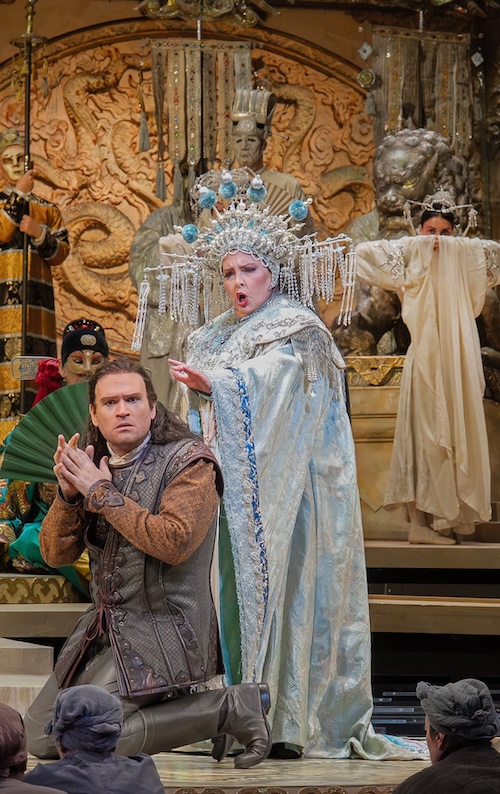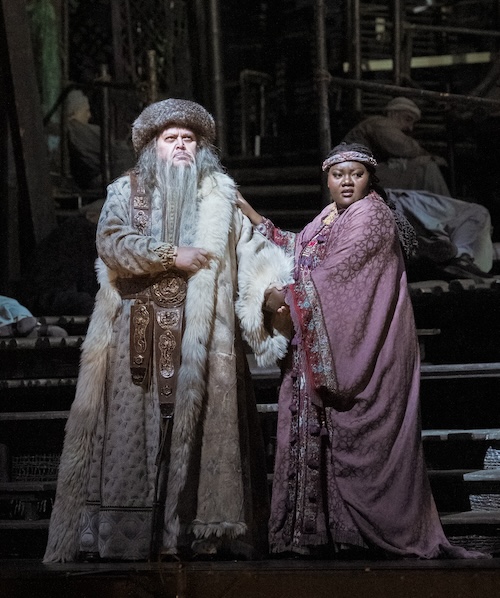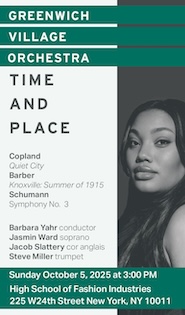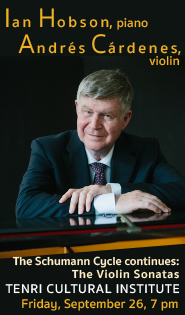Met’s sumptuous “Turandot” opens strongly with an auspicious soprano debut

Puccini’s Turandot is the backbone of the Metropolitan Opera’s 2025-26 season. Franco Zeffirelli’s spectacular, crowd-pleasing production returned Tuesday night, and will run again toward the end of the season. There will be two conductors and three different casts, including four different Turandots.
While there may indeed be an audience just for the wealth of architectural and ornamental details in the sets, the dazzling, glittering costumes, the crowds of choristers, supernumeraries, dancers and acrobats that spread across the stage and back into its depths, the focus for most aficionados will be the singers and their performances. Opening night delivered some excellent moments while proving a little uneven as an ensemble.
For this opening run, soprano Angela Meade sings the cruel princess Turandot; tenor Michael Fabiano is the headstrong prince Calaf, who seeks her hand by solving her three deadly riddles; Calaf’s father, King Timur, is bass Vitalij Kowaljow; and soprano Masabane Cecilia Rangwanasha is making her Met debut as the slave girl Liú. Carlo Rizzi conducts.
Meade and Fabiano seem ideally cast for roles that demand not just beauty but dramatic and powerful musicality. Meade was a vivid, dominating Turandot. Her singing was deceptively understated, an iron fist of force and expression wrapped in a velvet glove of focussed, firm, clear sound and intonation. She let the color of her voice speak for itself, with less emphasis on vibrato than one commonly hears. She had more than enough stamina for the long Act II stretch that begins with “In questa Reggia” and runs through the riddles, and the soprano kept stepping up the character’s grandeur and agitation.
The call and response between her and Fabiano in this scene was, rightly, the highlight of the performance. His singing here was at its most exciting, with a naturalness that gave heft to not just the music but the drama, and the brief introduction of the “Nessun dorma” melody was lovely. Fabiano has a spinto quality, ideal for this part, but it wasn’t always centered. He sang with strength in Act I, but pushed somewhat in the upper register, tightening his sound and knocking it astray.
These were relatively minor and temporary issues, and didn’t get in the way of the passion in his characterization. There was a vehemence to the way his Calaf set his mind on Turandot. In Act III, his “Nessun dorma” was surprisingly casual, unshowy, but musical—an out of the ordinary interpretation. The tenor also brought great tenderness to “Non piange, Liú.”

The vocal star was Rangwanasha. There is a charismatic sweetness to her sound and effortless carry. Her musicality was exceptionally graceful, and she was riveting in every one of Liú’s moments—from “Signore, ascolta” in Act I to “Tu, che di gel” in Act III. Her performance was so stellar that her character’s death left the resolution between Turandot and Calaf feeling a bit anticlimactic, even with the able transformations of the characters both singers brought, and the pageantry of the final scene.
Kowaljow was on the same level as Timur, singing with a pleasing, stately richness, and moving after Liú’s death. Ping, Pang, and Pong are baritone Hansung Yoo (making his debut), and tenors Tony Stevenson and Rodell Rosel. They made light work of the condescending mugging Puccini gives them, yet were totally involving in the more thoughtful, lyrical music they have in Act II. Bass-baritone Le Bu was an imposing Mandarin, and the chorus sang with such lustiness and power they often overshadowed the orchestra.
There was superb playing from the pit, which is always so consistently fine one almost doesn’t notice. They had it all; balances, color, phrasing. Rizzi’s pace was smooth, though there was an ebb to the energy in Act III. He made the interesting choice of pushing the harshness of Puccini’s dissonant low chords to the fore. All in all, this is as sturdy a Turandot as one would wish, with some exceptional moments.
Turandot runs through June 6. Rebecca Nash replaces Angela Meade October 18, and the next cast of Anna Pirozzi, Brian Jagde, Angel Blue, and John Relyea opens May 19. metopera.org


